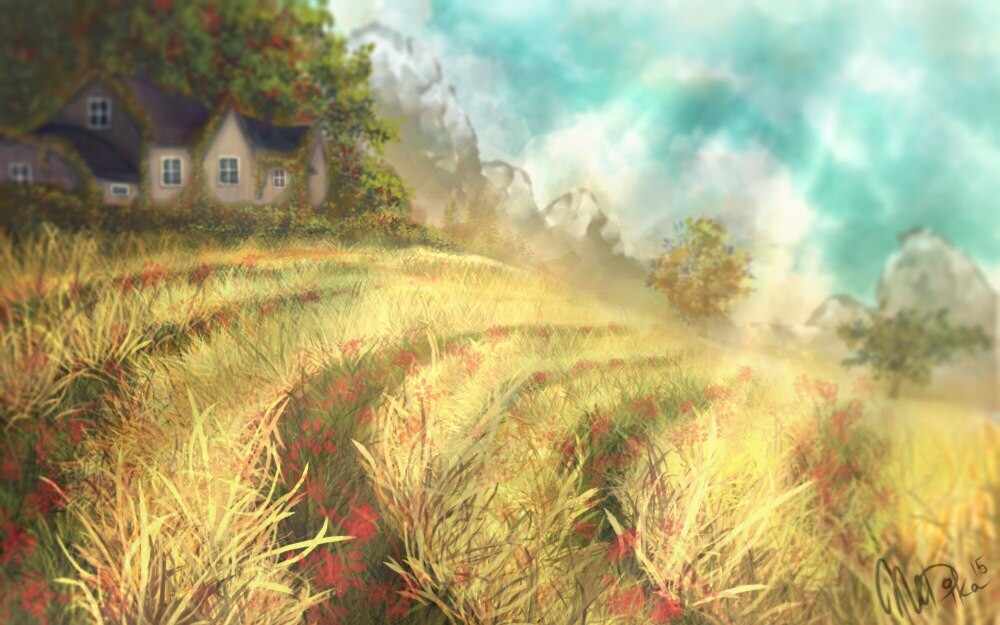Goldenmere
Nestled beyond the carved terraces and mist-slicked bridges of Tiderun lies a landscape altogether more open, more patient, and more enduring: the Sward of Goldenmere.
It is a realm of wide, rolling farmland with patchworks of fields, hedgerows, and soft hills cradling the heartland’s humble jewel: a still, glimmering lake known as Goldenmere. Said to reflect not only the sky, but a person’s truest self, the lake sits in a low basin at the center of the region, watched over by weeping willows and a stone bench older than any house still standing.
Where Tiderun rises in vertical splendor, Goldenmere stretches horizontally
History
The farmland here is older than any living halfling remembers and the soil runs dark and generous. Grainfields sway like amber, orchards bloom along the ridges, and vine-covered silos stand like markers on a vast, living map. The wind is present, carrying with it the scent of tilled earth, baking bread, and river grass.
But the Sward is not crowded. Instead, it is dotted with rural outcroppings with clusters of homes gathered around shared wells, aging windmills, or long communal sheds used during harvest. Smoke curls gently from homesteads miles apart, and it's not uncommon to walk an hour between neighbors.
Those who live here are called Fieldkin, and their days are governed not by bells or rites, but by sunlight, labor, and the patient rhythm of growing things.
Religion
The Fieldkin do not worship the Wanderer, as their kin in Tiderun do. To them, stories of gods fishing from wooden piers are folklore, not faith. Instead, they find sacredness in routine, discipline, and honest toil.
They speak often of “the Call to Field” not as prophecy or revelation, but as a deep-seated draw toward land and purpose. It is a belief that to plant and tend and reap is to fulfill one's rightful place in the world.
Children are taught to read the wind before they read books, to sharpen tools before telling stories. Their celebrations are quiet but heartfelt: the clinking of cider glasses after a long day, the simple reverence of a well-split loaf.
Magic is rare not forbidden, just seen as unnecessary. A well-plowed furrow earns more trust than a glowing charm. Yet there is deep respect for druids and green scholars, so long as they carry calluses on their palms.
Main Townstead
At the edge of the Goldenmere lake sits Wold, the largest and oldest settlement in the Sward. It is not a town of grandeur, but of function. Wold is shaped by what it needs: a communal oven, a grain hall, a low bridge crossing the Wren, and a weather-worn barn that triples as gathering hall, harvest shelter, and local archive.
Here, the council meets not in robes but in aprons, sitting on overturned barrels and discussing seed yields with the same gravity as border concerns.
Wold holds no inn, only spare rooms and borrowed beds. Hospitality is earned by how well one holds a rake, not by coin.
Though both regions stem from the same ancestral roots, Tiderun and Goldenmere are as different as hill and vale.
Tiderun greets the world with ceremony and kinbinding, a town built on myth and meaning. Goldenmere greets the world with a spare cup of tea and a rake already waiting in the field.
There is no rivalry between them, only difference. A Tiderun bard might find the Sward too quiet; a Fieldkin might find the valley too steeped in stories. But both know that when the world wavers, they will send food and aid to one another without question.
“Where soil is kin and sweat is prayer.”




Comments